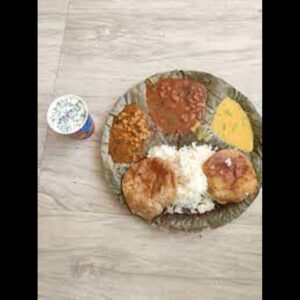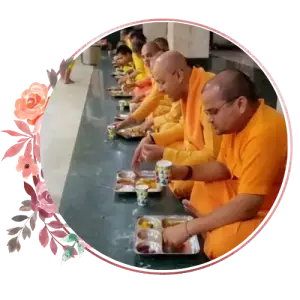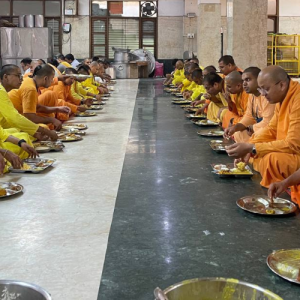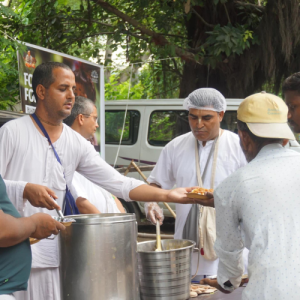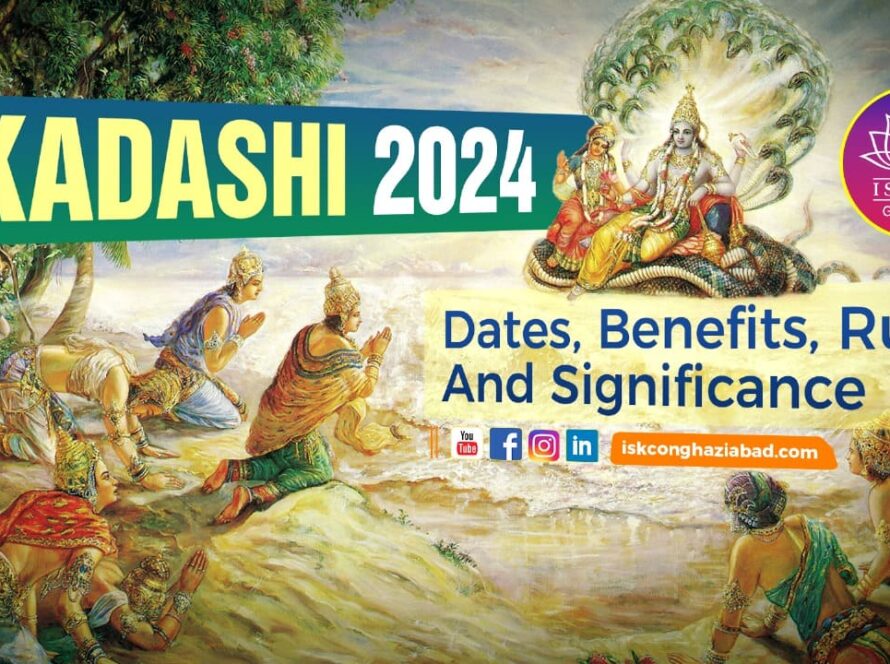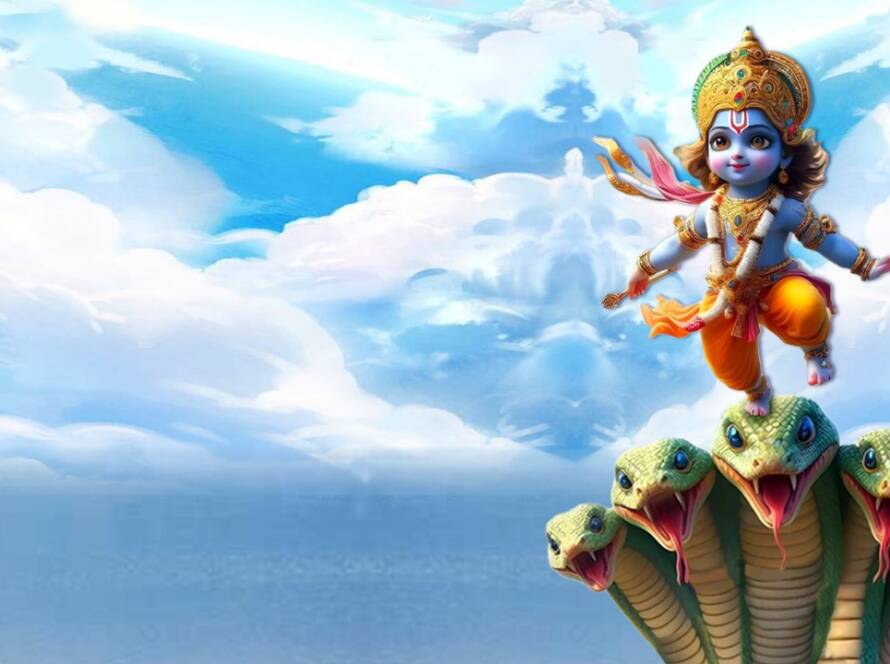Dussehra or Vijayadashami is not only a festival which is celebrated purely culturally. It marks the eternal victory of Dharma (good) over Adharma (evil). It reminds all the devotees of Lord Vishnu that no matter how good or bad any season gets, the divine power stands right against injustice and evil. On Dussehra, the teachings of Lord Vishnu as the preserver of the universe are relished more in the temples of ISKCON. They would keep their focus on the glory of Lord Vishnu and his divine incarnations in their prayers, kirtans, and all other forms of devotional service.
Lord Vishnu is the role of a sustainer of the universe. He takes incarnations (Avatars) to protect his devotees and bring balance in times of crisis. Dussehra is one such reminder of his divine presence. It is the victory of Lord Rama over Ravana. This story emphasizes the essential truth that evil will never prevail when the divine is present.
When is Dussehra?
We celebrate Dussehra or Vijayadashami on the tenth day of the waxing phase of moon (Shukla Paksha) of the Ashwin month in the Hindu lunar calendar just after Navaratri. This generally falls during the month of October. It concludes the nine-day festival of Navratri, wherein people worship the manifestations of Goddess Durga and the tenth day is Vijayadashami or Dussehra.
Tithi & Timings of Dussehra 2024
Dussehra 2024 falls on October 12, Saturday.
Devotees, mainly those from ISKCON will perform morning prayers; they will sing kirtan, and even perform Aarti unto Lord Krishna and Lord Rama.
Many people outside ISKCON pray specifically during the Vijay Muhurta (02:03 PM to 02:49 PM on October 12, 2024), which falls on Dussehra afternoon-a symbolic good time to invite blessings from the Supreme Godhead for prosperity and safety.
Story of Dussehra
The best-known history of Dussehra is of Lord Rama, one of the most popular avatars of Lord Vishnu. According to the epic Ramayana, the powerful Lord Rama showed his strength by fighting against the demon king Ravana, as Ravana had abducted his wife, Mata Sita. With the grace of Lord Vishnu and the assistance of Lord Hanuman and his army of fighters, Lord Rama defeated Ravana on the day of Dussehra.
This victory led to the end of oppressiveness, greed, and ego. Ravana with ten heads exemplified all the different vices that sully the human mind. The defeat of Ravana showed that the only path to eternal peace lays through virtue, devotion, and humility.
For devotees of ISKCON, this victory holds a very special place in history. The lessons of the Ramayana, especially the highlighted about Lord Rama’s devotion to Dharma, teach us to live a life of righteousness and surrender to Lord Vishnu. The discourses in the ISKCON temple revolve around deeper spiritual lessons of surrender, faith, and divine protection on the journey of Lord Rama.
What to Do on Dussehra?
Dussehra is a day when the devotees of ISKCON get to rejoice and at the same time renew their vows with the Supreme Personality of Godhead. Here is an outline of spiritual activities mostly done on this day by devotees:
- Prayers from the devotees: Prayers to Lord Vishnu and his avatar Lord Rama mark the beginning of the day. Here, the devotees seek his blessings for strength, protection, and the victory against their inner evils.
- Holy Names Chanting: In ISKCON temples, Kirtans or chanting of the Lord’s holy names (Hare Krishna Mahamantra) take place throughout the day. The devotional practice forms a way through which people may establish contact with the divine and purify their hearts.
- Read the Ramayana: During Dussehra, the Ramayana is read as a reminder of Lord Rama’s journey and all that signifies the essentials of Dharma in life. Most ISKCON temples conduct the reading of this sacred scripture. It gives people the message of Lord Ram.
- Ramlila: Most ISKCON centers, besides other places organize dramatization of life events of Lord Rama. Watching this dramatization will deepen the realization of sacrifices that Lord Rama had to undergo for the sake of righteousness.
- Seva (Service): Dussehra is also a day for charity and service. Many ISKCON devotees take time out to serve others, making donations in the temple or giving food to the needy, according to Lord Vishnu’s compassion.
To be able to feel such feelings and understand what actual victory over evil means, one can do these activities.
How to celebrate Dussehra
Dussehra is more than a grand celebration of rituals and traditions. It has profound spiritual importance, especially in ISKCON for the devotees of Lord Vishnu. Here is how Dussehra can be spiritually enriching enough. Devotional activities brim with surrender to the divine and purify one’s soul.
- Morning Prayers and Meditation: Start the day by offering early morning prayers to Lord Vishnu along with meditation about his divine forms and his role as the one in preserving the universe. The Hare Krishna Mahamantra can help the devotee fix his mind on the Lord.
Hare Krishna Mahamantra:
HARE KRISHNA HARE KRISHNA, KRISHNA KRISHNA HARE HARE
HARE RAMA HARE RAMA, RAMA RAMA HARE HARE
- Special Aartis: In most of the ISKCON temples, special aartis are performed on Dussehra with mostly deified lamps. These aartis often dedicated to Lord Rama and Lord Vishnu are done where devotees gather singing devotional hymns in praise of the Lord. They also offer lamps and flowers, and pray for peace and prosperity.
- Perform kirtans: Kirtan is an integral part of ISKCON celebrations. Chanting and singing the Lord’s holy names become a significant spiritual activity during Dussehra. These energetic and joyful kirtans unite the devotees with one other and fill the temple environment with love, devotion, and joy.
- Puja and Offerings: This day is celebrated with special pujas related to the victory of Lord Rama. Devotees, on this day, offer fruits, flowers, and incense to the Lord seeking his grace; doing so at home or in temples is considered exceptionally auspicious.
- Burning of Ravana’s Effigy: While Dussehra marks the end in many parts of India with the ceremonial burning of Ravana’s effigy. This represents the evil forces and their annihilation, in ISKCON, the focus is much more on the introspective battle, conquering what lies deep within us; pride, anger, greed.
- Serve and Donate: Some places in service (seva) and offering donations on Dussehra is known to be done with profound spiritual wisdom. Clothes or monetary support or food donations to temples and to the needy is believe to give a gift to Lord Vishnu.
It is said in the Bhagavad Gita that charity is very important because even when donation is performed without the intention to receive any return for it.
Bhagavad Gita (Chapter 17, Verse 20)
“दातव्यमिति यद्दानं दीयतेऽनुपकारिणे |
देशे काले च पात्रे च तद्दानं सात्त्विकं स्मृतम् ||”
“dātavyam iti yad dānaṁ dīyate ‘nupakāriṇe
deśe kāle ca pātre ca tad dānaṁ sāttvikaṁ smṛtam”
Meaning: Charity given out of duty, without expectation of return, at the proper time and place, and to a worthy person, is considered to be in the mode of goodness.
Spiritual Symbolism of Dussehra
Dussehra is a festival that not only represents the beheading of evil in the literal sense but has deep symbolic meanings guiding us in our path. Here are a few important spiritual insights:
- Victory Over the Ego: Ravana is, in fact, the ego which, in life, brings all sorts of troubles; pride, jealousy, anger, and attachment. Thus, the victory of Lord Rama over Ravana is a victory that stands for a continuous victory for the soul over the ego. It gives one a feeling that a devotee should never be egoistic and stay only grounded in Dharma. He should never move away from the will of Lord Vishnu.
- Restoration of Dharma: Dussehra shows the return to Dharma or righteousness. As the preserver, Lord Vishnu is always busy in maintaining a balance in this universe. His avatar as Lord Rama displays the order of living a life with truth, compassion, and duty. Through Dussehra, devotees are encouraged to walk along this path and overcome any obstacles that stand in their journey toward Dharma.
- Inner Purification: The devotional activities of Dussehra will purify the heart and minds of the devotee. The killing of Ravana is not only an evil king but depicts the reducing of negative tendencies in us. This is, in ISKCON, depicted as a time for introspection and surrender.
- Celebrating Devotion: Dussehra also celebrates the importance of devotion in life. Lord Rama’s devotion towards his duties and the love that he shared with his devotees is the highest level of surrender for a man. In the same way, devotees are guided to maintain their faith in Lord Vishnu and to surrender to his divine will. People know that he would help them overcome the challenges in life.
Importance of Dussehra in ISKCON
ISKCON Dussehra is the experience of this glorious historical occasion but as a real, spiritual lesson. It is observed by intense devotion and consciousness of the teachings of Lord Vishnu. Spiritual discourses, chanting, and bhajans let the devotees engage more closely with Lord Rama.
- Lord Rama as the Ideal in Life: The life of Lord Rama is very much described in ISKCON as something, where one would perfectly follow Dharma. It actually explains the various qualities of compassion, humility, and devotion to truth. The qualities that a true devotee tries to imbibe in his or her life.
- Preachings of Sri Valmiki Ramayan: On Dussehra, the lessons of Sri Valmiki Ramayan have to be learnt. The lessons in Ramayan give meanings to the fight between good and evil in each one of us. By submitting to Lord Ram, we could conquer the battles going on within ourselves.
- Cultivating Bhakti Yoga or Devotional Service: ISKCON lays intense focus on the devotional way known as bhakti yoga. On Dussehra, devotees are encouraged to deepen their devotional practices such as chanting Shri Hare Krishna Mahamantra, reading scriptures like Shrimad Bhagwatam, and acts of service in the spirit of surrendering to Lord Vishnu.
